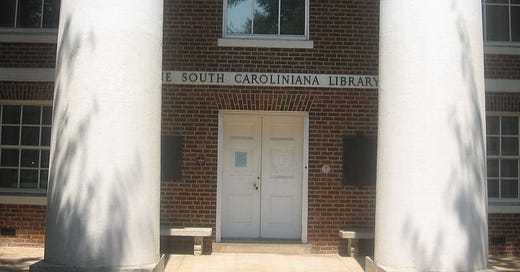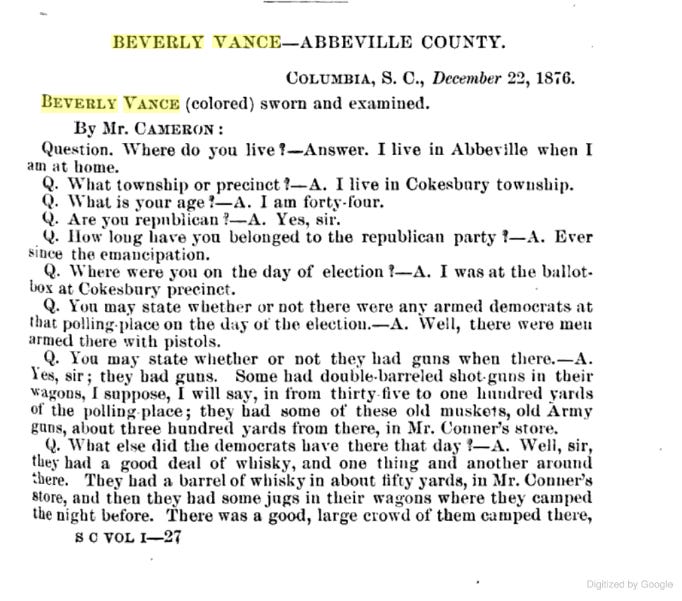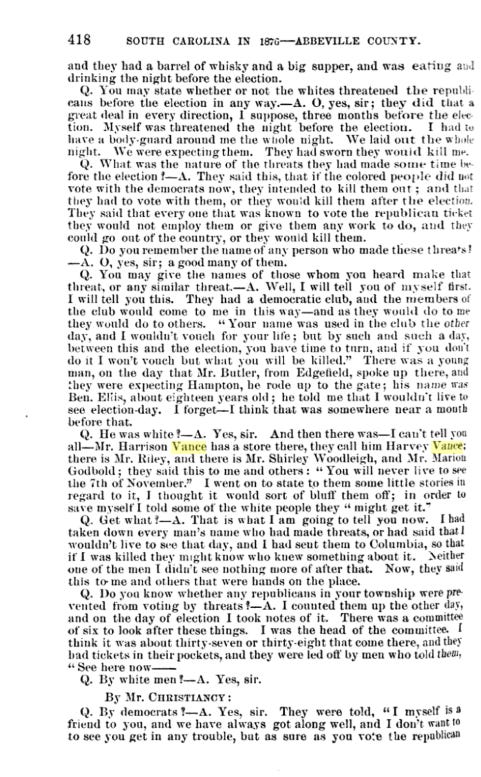Records Are Tied to Geography: The Story of Beverley Vance
How a Rare Testimony Brought My Second Great-Grandfather’s Voice to Life
One of the most powerful lessons I’ve learned in my years of family history research is this: records are deeply tied to geography. Where our ancestors lived—down to the county and even the town—can determine what documents exist and where they are preserved today. Many of these records are tucked away in special collections or archives, far from the digital indexes we often rely on.
In this post, I want to share an experience that forever changed the way I approach genealogy. It’s the story from 2010 of how I uncovered a rare and moving testimony given by my second great-grandfather, Beverley Vance (1832-1899), in 1876. Remember that his name is also spelled Beverly. This moment stands out as one of the most meaningful discoveries in my journey. It reminded me that the past lives on in quiet corners of libraries and archives waiting for someone to come looking.
I invite you to read how I found this precious record—and how it brought the life of one ancestor into full view. May it inspire you to search just a little deeper and perhaps visit the places your own ancestors once called home.
Starting out in Joliet, Illinois
I am sharing this post, Records Are Tied to Geography, to illustrate just how vital it is to explore the local repositories in the places where our ancestors lived. Without doing so, I would never have discovered a remarkable and deeply personal record tied to my second great-grandfather, Beverley Vance (1832–1899). This discovery stands out as one of the most unique and meaningful in my journey.
I often refer to my approach as “looking under every rock and in every crevice.” That mindset has truly paid off in my search for historical documentation. For many years when I was in Joliet, Illinois all I knew of Beverley came from his listing in the 1880 U.S. Census. That one record was my starting point—but it was only the beginning.
Here is the 1880 Census with Beverley Vance in Cokesbury Township, Abbeville County, South Carolina:

At the Joliet library, I found a reference in Allen B. Ballard’s book, One More Day’s Journey: The Story of a Family and a People, which mentioned Beverley giving testimony in Columbia in 1876. Ballard’s citation led me to a rare volume housed at the South Caroliniana Library: South Carolina in 1876—a compilation of testimonies from Republicans and Democrats detailing voter suppression during Reconstruction.
Finding the Account of Beverley
From the outset, my desire to preserve my family history and pass it on to future generations was a powerful motivation. It even prompted my family to relocate closer to the places where these precious records could be uncovered. One of my first research stops was the South Caroliniana Library, nestled on the historic campus of the University of South Carolina in Columbia, South Carolina.
I submitted a request to view the book. As I sat and waited, my heart beat faster, realizing I was moments away from encountering a document written in Beverley’s lifetime—his own words preserved through history. That sense of reverence deepened as the librarian gently placed the large volume before me and quietly walked away. I turned the pages to the one referenced—and there was his name.
That moment was profoundly emotional. As I read Beverley's testimony, the story of his life began to take shape in greater detail. He had lived through enslavement, cast his vote in 1876, and spoke clearly and firmly for justice in turbulent times. His integrity and devotion to his family and community came through in every word.
Learning about Beverley
Today, that very testimony is available on Google Books, and I've since uncovered additional records tied to him. But it was that first encounter—with an original volume—that changed everything for me. Beverley became more than a name or a date—he became a role model. A man who endured great hardship, stood up for what was right, and paved a way for generations to come.
If Beverley could speak to us today, I believe he would remind us that actions speak louder than words. And in many ways, I strive to live by that same principle. The way we live our lives reflects our beliefs more than anything we might say.
Though I still have unanswered questions, I know that continuing to follow the trail of records—in the counties where Beverley lived—will yield even more of his story. I hope by sharing this experience, you feel inspired to look deeper and seek out the stories of your own ancestors. There is something humbling and sacred in discovering where and how they lived—and in preserving that history for those who come after us.
Below, I’ve included Beverley Vance’s full testimony, delivered before the Senate in Columbia, South Carolina on 22 December 1876. He was forty-four years old at the time and lived in Cokesbury, Abbeville County, South Carolina. His words stand as a powerful testament to his character and to the times in which he lived. Next, we will take small parts of the testimony and see what we can learn.
Miscellaneous Documents 30th Congress, 1st Session - 48th Congress, 2d Session and Special Session · Volume 6, Part 1 By United States. Congress. Senate · 1877 - Page 417-423 (Entitled South Carolina in 1876 at South Caroliniana Library)
Miscellaneous Documents 30th Congress, 1st Session - 48th Congress, 2d Session and Special Session · Volume 6, Part 1 By United States. Congress. Senate · 1877 - Page 417-423 (Entitled South Carolina in 1876 at South Caroliniana Library)
Miscellaneous Documents 30th Congress, 1st Session - 48th Congress, 2d Session and Special Session · Volume 6, Part 1 By United States. Congress. Senate · 1877 - Page 417-423 (Entitled South Carolina in 1876 at South Caroliniana Library)
Miscellaneous Documents 30th Congress, 1st Session - 48th Congress, 2d Session and Special Session · Volume 6, Part 1 By United States. Congress. Senate · 1877 - Page 417-423 (Entitled South Carolina in 1876 at South Caroliniana Library)
Miscellaneous Documents 30th Congress, 1st Session - 48th Congress, 2d Session and Special Session · Volume 6, Part 1 By United States. Congress. Senate · 1877 - Page 417-423 (Entitled South Carolina in 1876 at South Caroliniana Library)
Miscellaneous Documents 30th Congress, 1st Session - 48th Congress, 2d Session and Special Session · Volume 6, Part 1 By United States. Congress. Senate · 1877 - Page 417-423 (Entitled South Carolina in 1876 at South Caroliniana Library)
Miscellaneous Documents 30th Congress, 1st Session - 48th Congress, 2d Session and Special Session · Volume 6, Part 1 By United States. Congress. Senate · 1877 - Page 417-423 (Entitled South Carolina in 1876 at South Caroliniana Library)
I show you how I found my formerly enslaved ancestors:














Thank you for sharing this remarkable document and story.
As a family artifact, your great-grandfather’s testimony is an incredible treasure and legacy of courage and honor.
As a historical document it is a stunning first hand account of a chapter of our collective history we need to acknowledge and preserve.
Again, thanks for your tenacity in finding it and sharing it.
What an amazing find, great job of sleuthing it out! A great glimpse into the times, and the day to day bravery it took to do the right thing. I an sure there were continued reprecussions for testifying. I bet the newspapers around that time are fascinating too! Thanks for sharing!